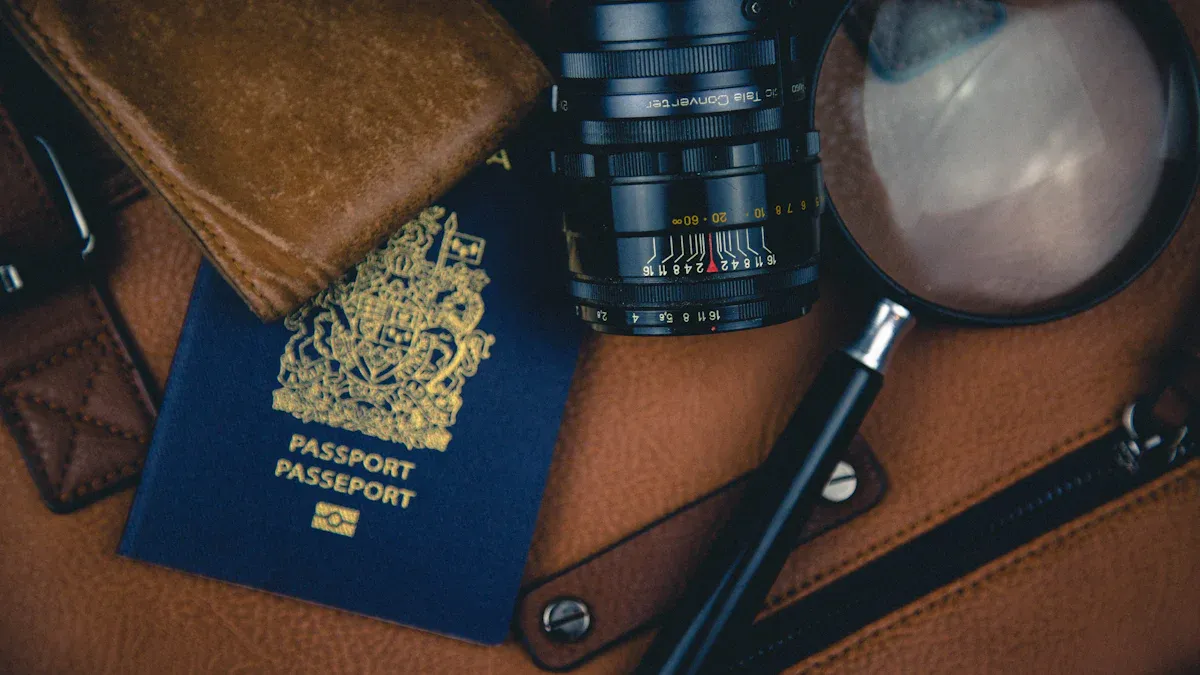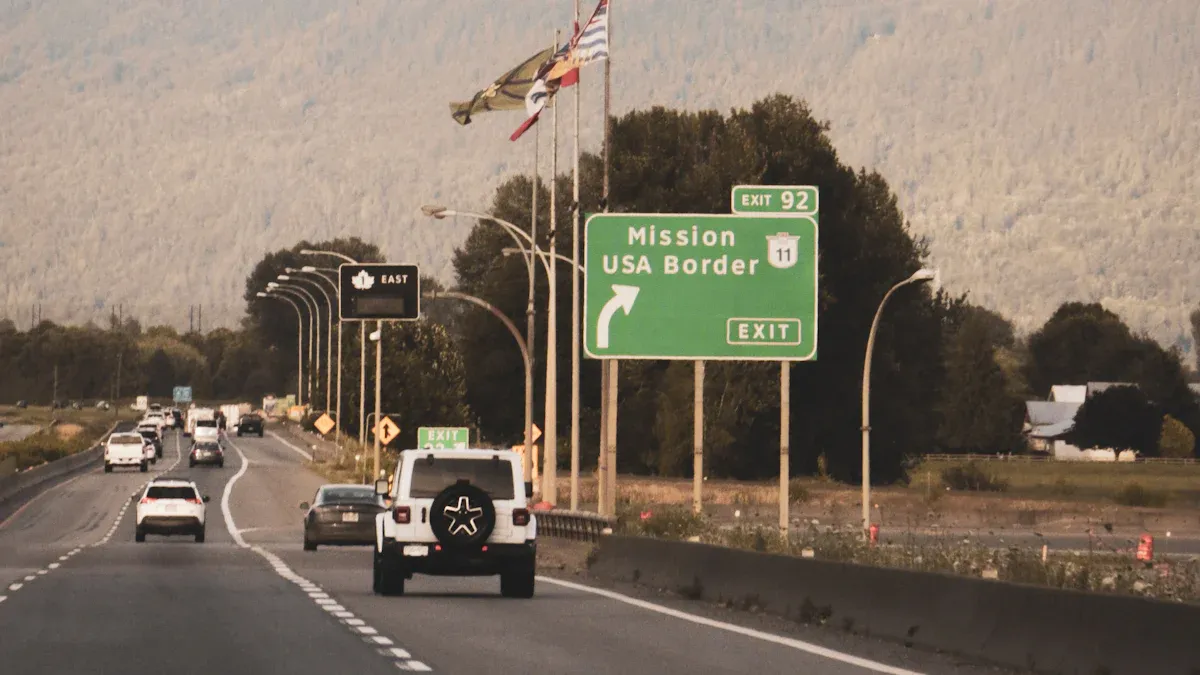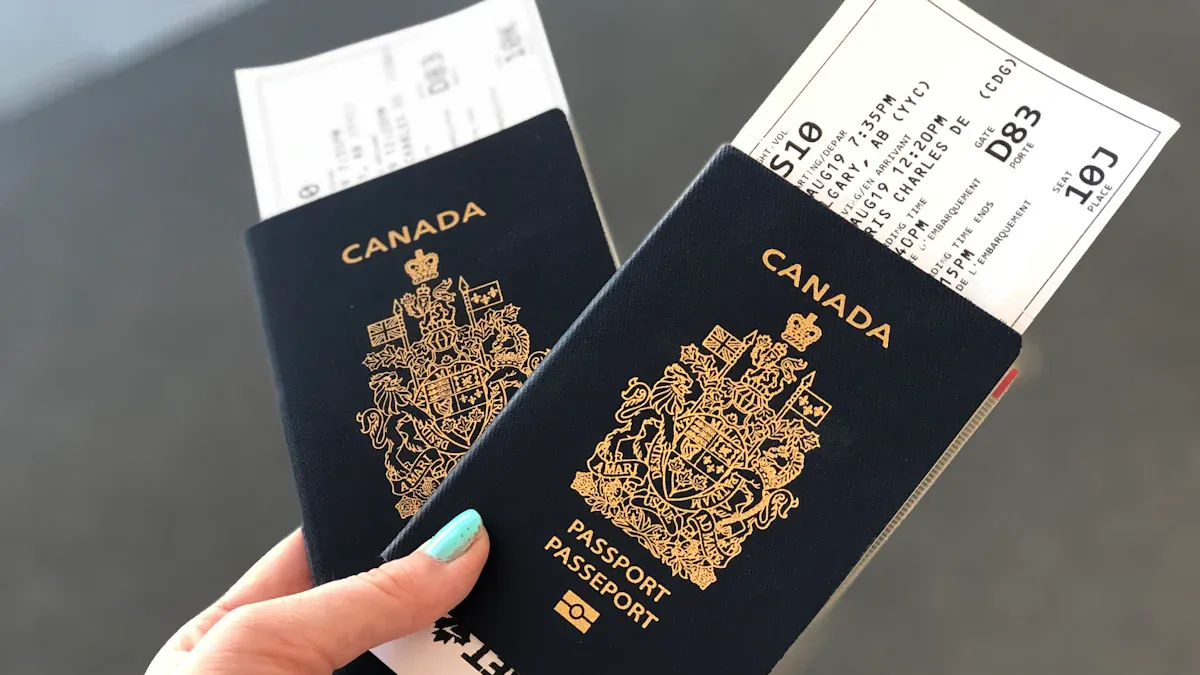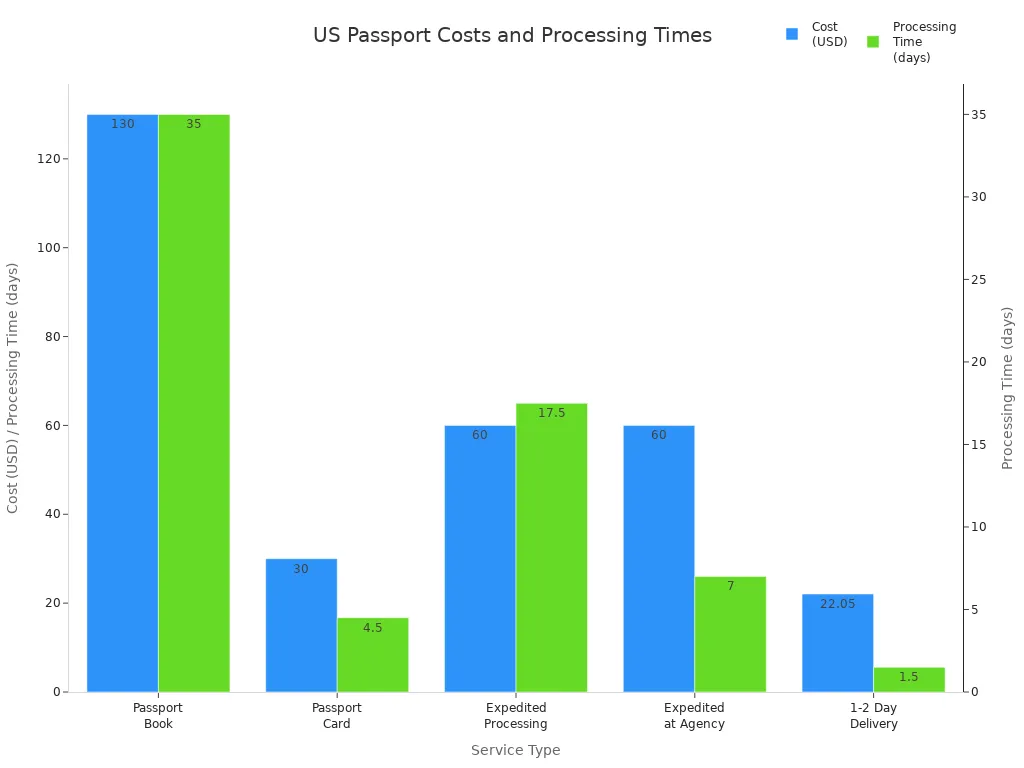- EasyCard
- Trade
- Help
- Announcement
- Academy
- SWIFT Code
- Iban Number
- Referral
- Customer Service
- Blog
- Creator
What You Need to Know About Passports for Canada Trips

Image Source: unsplash
When traveling to Canada from the United States, you must follow strict passport requirements. U.S. citizens need a valid passport to enter Canada. For air travel, a passport book is required. Land or sea travelers may use a passport card or trusted traveler card. Always check official updates.
- U.S. citizens do not need an eTA when flying to Canada.
- Land and sea crossings accept passport cards and trusted traveler cards.
Key Takeaways
- Always carry a valid passport when traveling to Canada by air; for land or sea travel, you can use a passport book, passport card, or enhanced driver’s license from certain states.
- Children under 16 need proof of citizenship like a birth certificate for land or sea travel, but must have a passport for air travel; minors traveling alone require additional authorization letters.
- Check your documents carefully before your trip to avoid denial at the border due to expired passports, criminal records, or inconsistent information; always verify the latest entry rules from official sources.
Passport Requirement for Entering Canada

Image Source: unsplash
Air Travel Passport Rules
When you travel by air from the United States to Canada, you must follow strict passport requirement rules. Airlines and the Canadian government both require you to show a valid US passport or a NEXUS card. Most airlines, including Air Canada, will not let you board your flight if you do not have the correct documents. Your appearance must match the photo on your passport or NEXUS card. If you refuse to show your documents, you will not be allowed to board.
You should always carry a valid passport when flying to Canada. The passport is the only travel document accepted everywhere for international flights. While the Canadian government lists other documents, such as a birth certificate or certificate of citizenship, airlines may not accept them. If you are a member of the NEXUS program, you can use your NEXUS card for air travel. U.S. permanent residents must show both a valid passport and their Green Card.
Tip: Always check your passport before your trip. Make sure your photo is clear and your information matches your ticket.
Land and Sea Passport Options
If you plan to cross the Canadian border by land or sea, you have more options. The passport requirement for these travel methods allows several types of documents. You can use a valid US passport, a US passport card, or an enhanced driver’s license. Some states, like Michigan, Minnesota, New York, Vermont, and Washington, issue enhanced driver’s licenses. These licenses prove both your identity and citizenship.
Here is a table showing accepted documents for land and sea entry into Canada:
| Document Type | Description / Use Case |
|---|---|
| U.S. Passport | Preferred document for entry by land or sea. |
| U.S. Passport Card | Accepted for land and sea crossings. |
| Enhanced Driver’s License (EDL) | Issued by MI, MN, NY, VT, WA; accepted for land and sea entry. |
| Birth Certificate + Photo ID | Accepted for U.S. citizens, but only with a government-issued photo ID. |
| Naturalization/Citizenship Certificate + Photo ID | Accepted for U.S. citizens with a government-issued photo ID. |
| Trusted Traveler Cards (NEXUS, SENTRI, FAST) | NEXUS and SENTRI accepted for land and sea; FAST accepted for commercial drivers only. |
| Children under 16 | Only need proof of citizenship, such as a birth certificate. |
You must meet all border requirements when entering Canada. If you use a birth certificate or certificate of citizenship, you must also show a government-issued photo ID, like a driver’s license. Children under 16 only need proof of citizenship, but carrying an ID is a good idea.
Note: The passport requirement does not include a six-month validity rule for the United States and Canada. Your passport only needs to be valid at the time of entry into Canada. This rule comes from an agreement between the two countries. You do not need to worry if your passport will expire soon after your trip, as long as it is valid when you cross the border.
You should always check the latest requirements to enter Canada before your trip. Border requirements can change, and having the right documents will help you avoid problems at entry. If you plan to use an alternative document, make sure it is accepted for your travel method.
Accepted Passport Documents

Image Source: unsplash
When you travel to Canada, you must bring proper identification that meets border requirements. The Western Hemisphere Travel Initiative (WHTI) lists several documents you can use. Each document has different rules for air, land, and sea travel. The table below shows which documents you can use for each travel method:
| Travel Mode | Accepted Documents for U.S. Citizens |
|---|---|
| Air | Passport Book, NEXUS Card |
| Land & Sea | Passport Book, Passport Card, Enhanced Driver’s License, NEXUS, SENTRI, FAST Cards |

US Passport Book
You need a passport book for all international air travel to Canada. This document works for land and sea crossings too. The passport book has many pages for stamps and visas. It uses biometric technology to keep your information safe. Adults get a passport book that lasts 10 years. Canada only asks that your passport is valid when you enter. You do not need six months of validity.
US Passport Card
A passport card is a wallet-sized card. You can use it for land and sea travel between the U.S. and Canada. You cannot use it for air travel. The passport card costs less than the passport book. It is a good choice if you cross the border by car or boat.
Enhanced Driver’s License
Five states—Michigan, Minnesota, New York, Vermont, and Washington—offer enhanced driver’s licenses. These licenses prove your citizenship and identity. You can use them for land and sea travel to Canada. You cannot use them for flights. The license has a chip to speed up border checks.
Trusted Traveler Cards (NEXUS, SENTRI, FAST)
Trusted Traveler cards help you cross the border faster. NEXUS works for air, land, and sea travel to Canada. SENTRI and FAST are for land and sea crossings. You must apply and get approval from both the U.S. and Canada. These cards show you meet border requirements and are low-risk travelers.
Tip: Always check which documents are accepted for your travel method before your trip. This helps you meet border requirements and avoid problems.
Canada Passport Requirements for Special Cases
Minors and Children
Traveling with children or minors to Canada involves special rules. You must follow strict requirements for documentation. The table below shows what you need for different situations:
| Travel Scenario | Required Documentation | Additional Notes |
|---|---|---|
| Minor traveling alone | Passport, birth certificate, letter of authorization from both parents or legal guardian | Letter should include contact details and be in English or French |
| Minor with one parent | Passport, birth certificate, letter of consent from non-traveling parent, copy of non-traveling parent’s ID | Carry custody or death certificates if needed |
| Minor with legal guardian | Passport, guardianship or adoption papers | Proof of guardianship required |
| Minor with other adults | Passport, written permission from parents or guardians, copy of their IDs | Strongly recommended for smooth entry |
Children under 16 cannot cross the border alone. If you travel with a child who is not your own, you must carry a letter of permission. Airlines may also have extra requirements for minors flying alone. U.S. citizen children need a passport for air travel. For land or sea, children under 16 can use a birth certificate or citizenship certificate.
Tip: Always bring a notarized letter of consent if a child travels without both parents.
US Permanent Residents
If you are a U.S. permanent resident (Green Card holder), you do not need a visa to visit Canada. You must show your valid passport and Green Card at the border. For air travel, you also need to get an Electronic Travel Authorization (eTA) before your trip. Land and sea travelers do not need an eTA. Always check for any new requirements before you travel.
- Bring your passport and Green Card.
- Apply for an eTA if you fly to Canada.
- Check for health or security restrictions.
Dual Citizens and Canadian Citizens
If you hold both U.S. and Canadian citizenship, you must use your Canadian passport to enter Canada. Canadian citizens cannot use a U.S. passport or other documents to enter Canada. Dual citizens should always travel with both passports. This helps you meet all entry requirements and avoid delays.
- Canadian citizens must show a valid Canadian passport.
- Dual citizens should carry both passports when traveling.
Non-US Citizens
Non-U.S. citizens face different requirements for entering Canada. The table below explains what you need based on your status:
| Traveler Category | Required Documentation | Notes |
|---|---|---|
| Non-U.S. citizens flying to Canada | Electronic Travel Authorization (eTA) | Linked to your passport, valid for air travel only |
| Non-U.S. citizens by land or sea | Visitor Visa | Needed for car, train, bus, or boat travel |
| U.S. permanent residents | Passport from your country + Green Card | eTA needed for air travel |
| Students or workers returning from U.S. | Study/work permit + passport + proof of U.S. status | No visa or eTA needed if returning directly |
Always check the latest requirements before your trip. Canada updates its entry rules often. Make sure your passport and other documents are valid and ready.
Reasons for Denial When Entering Canada
Criminal Record Issues
Canadian border officials take criminal records very seriously. If you have a DUI or any impaired driving conviction, you may face denial when entering Canada. This rule applies even if your conviction happened many years ago. Canada treats DUI offenses as a major reason for refusing entry. Border officers can check US criminal records without time limits. If you have a past DUI, you should seek legal advice before your trip. You may need to apply for a Temporary Resident Permit or Criminal Rehabilitation to meet immigration requirements. Other criminal offenses can also affect your entry into Canada, but DUI remains the most common problem for US citizens.
Insufficient Documentation
You must bring the correct documents to meet Canada’s entry requirements. Many US citizens get denied at the border because of expired passports, damaged documents, or visas that do not match the purpose of their visit. Using forged or fake documents can lead to arrest. If your passport is expired or your visa is not valid, border officials may ask you to withdraw your application for entry instead of giving a formal denial. Always check your documents before your trip to avoid problems.
- Common documentation issues include:
- Expired passports
- Damaged passports
- Incorrect or expired visas
Other Common Entry Problems
Border officials may deny entry for reasons beyond criminal records or paperwork. You must show you have enough money for your stay. If you cannot prove this, you may not meet the requirements for entry into Canada. Health issues, such as contagious diseases or missing vaccinations, can also cause problems. If you lie or give false information, you risk being turned away. Admitting to illegal drug use, including marijuana, can lead to denial. If you plan to work or stay in Canada without proper permission, you may face refusal.
| Reason for Denial | Explanation |
|---|---|
| Intention to stay indefinitely | If officials think you will not leave Canada, you may be denied. Show proof of ties to the US, like a job or home. |
| Past immigration violations | Breaking Canadian immigration requirements in the past can result in bans. |
| Lack of funds | You must show you can support yourself during your visit. |
| Health grounds | Certain health risks or diseases may stop you from entering. |
| Active warrants | If you have an active warrant, you may be denied or detained. |
Tip: Always review Canada’s latest immigration requirements before your trip. This helps you avoid common problems and ensures a smooth entry.
Travel Tips for Entering Canada
Always Carry a Valid Passport
When traveling to Canada, you should always carry a valid passport. Border officers will ask for your passport at every entry point. A valid passport proves your identity and citizenship. If you travel by air, you must show your valid passport. For land or sea crossings, you may use a passport card or enhanced driver’s license, but a passport book works for all methods. Keeping your passport safe and undamaged helps you avoid delays. You should check the expiration date before your trip. If your passport will expire soon, renew it before traveling.
Tip: Carry proper identification for every family member, including children. This helps you cross the border smoothly.
Check for Updates Before Travel
Entry requirements for Canada can change. You should check for updates before every trip. Updates may happen at any time. Reliable sources help you stay informed:
- Canadim Immigration Newsletters
- Canadim official Express Entry pages
These sources share news about trends and upcoming changes. Staying informed helps you avoid surprises at the border.
Ensure Document Consistency
You must make sure all your travel documents match. Your name, date of birth, and other details should be the same on your passport, tickets, and other papers. If you present inconsistent documents, Canadian officials may refuse your entry. Under Section 40 of the Immigration and Refugee Protection Act, giving false or inconsistent documents can lead to a five-year ban from Canada. You may also lose any legal status you hold in Canada. Always double-check your documents before traveling.
Official Resources
You can find the latest entry rules on official websites. Trusted resources include:
- Immigration, Refugees and Citizenship Canada (IRCC) website
- Canada Border Services Agency (CBSA) website
These sites give accurate and current information for travelers. Checking these resources before traveling helps you meet all requirements.
When you travel to Canada, always carry a valid passport and check its expiration date. Canadian border officials recommend you use a passport for all trips. Review travel advisories, organize your documents, and prepare copies. These steps help you avoid problems and ensure a smooth entry into Canada.
FAQ
Do you need a passport to drive from the US to Canada?
Yes, you need a valid passport, passport card, or enhanced driver’s license. Children under 16 can use a birth certificate.
Can you use a US passport card to fly to Canada?
No, you cannot use a US passport card for air travel. You must use a passport book or a NEXUS card for flights.
How long does your passport need to be valid to enter Canada?
Your passport only needs to be valid at the time you enter Canada. Canada does not require six months of validity for US citizens.
Preparing for a Canada trip requires careful attention to passport rules, but managing travel funds can be just as critical. For seamless cross-border payments, consider BiyaPay. BiyaPay offers transfer fees as low as 0.5%, a fraction of traditional bank charges like SWIFT, which can exceed $50. With real-time exchange rate transparency, you can convert over 30 fiat currencies or 200+ cryptocurrencies, ensuring cost-effective payments for travel expenses or emergencies. Whether funding a hotel booking, sending money to family in Canada, or managing multi-currency needs, BiyaPay delivers funds often within the same day across 100+ countries. Registration is quick, taking just minutes with simple identity verification—no complex paperwork. Back Riccardo by robust security and U.S./New Zealand regulatory compliance, BiyaPay keeps your transactions safe. Simplify your travel finances and join BiyaPay today for fast, affordable, and secure global payments tailored to your journey.
*This article is provided for general information purposes and does not constitute legal, tax or other professional advice from BiyaPay or its subsidiaries and its affiliates, and it is not intended as a substitute for obtaining advice from a financial advisor or any other professional.
We make no representations, warranties or warranties, express or implied, as to the accuracy, completeness or timeliness of the contents of this publication.




Contact Us
Company and Team
BiyaPay Products
Customer Services
is a broker-dealer registered with the U.S. Securities and Exchange Commission (SEC) (No.: 802-127417), member of the Financial Industry Regulatory Authority (FINRA) (CRD: 325027), member of the Securities Investor Protection Corporation (SIPC), and regulated by FINRA and SEC.
registered with the US Financial Crimes Enforcement Network (FinCEN), as a Money Services Business (MSB), registration number: 31000218637349, and regulated by FinCEN.
registered as Financial Service Provider (FSP number: FSP1007221) in New Zealand, and is a member of the Financial Dispute Resolution Scheme, a New Zealand independent dispute resolution service provider.




















